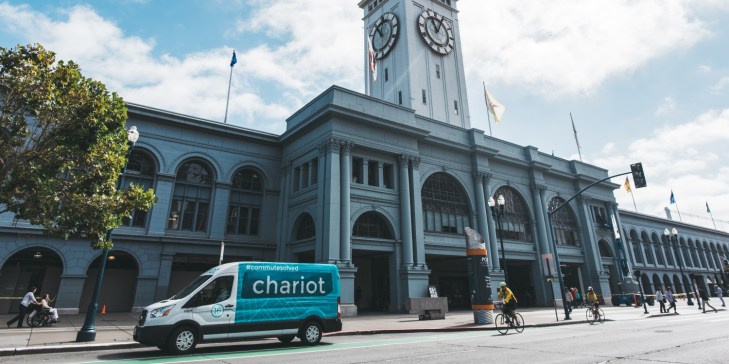Chariot, the Ford-owned collaborative carpooling service currently operating in the Bay area, has launched advance reservations, letting riders book a seat on a Chariot up to seven days ahead of their actual trip. Previously, the only option was to grab a ride ad-hoc shortly before departure, an option which will continue to be offered alongside advance scheduling.
The decision to add an advance booking option was made because Chariot found that a lot of its users were using the service in predictable patterns, with regular frequency and along the same routes. It makes sense, given that Chariot is often used either for a rider’s entire commute, or for the first- or last-mile of a trip to and from work, getting riders from their homes or offices to a main transit artery like Caltrain, BART or the ferry.
Chariot will send a text to a rider who books in advance between 10 and 15 minutes before they need to be at their pickup spot, with the exact time of the pickup. The company says it built the feature in just a month, and is deploying it in its launch market of SF in hopes of refining it before it expands its overall services to additional cities over “the coming months.” Most recently, Chariot started running a last-mile route in Austin ahead of a wide public launch in the city happening in the next few weeks.
[gallery ids="1418978,1418979"]
“About 80 percent of our riders are taking Chariot more or less within 15 minutes of the same time four or five days a week,” explained Chariot founder and CEO Ali Vahabzadeh in an interview. “We can’t think of anything more routine than someone’s commute, so why not make things easier and provide the ability to schedule this, and then it’s just one less thing they have to worry about when they wake up in the morning.”
Chariot will continue to offer instant on-demand service, too, and isn’t setting aside a specific amount of seats for either option. The company is using this launch to determine how much riders value this option as compared to others in preparation for rollout of its services to other city in the new year.
Remember that Chariot was acquired by Ford Smart Mobility earlier this year – I asked Vahabzadeh how this fits in with the carmaker’s larger plans around the future of transportation.
“If we think about Ford Smart Mobility’s overall efforts, we want to make it as easy as possible for the urban dweller to get around, and every city’s needs are different,” he explained. “This allows us to cater to people who either want to grab a ride when they’re ready, whenever they’re ready. Or there may are certain markets or cohorts of riders who want to plan out the week’s commute the way they plan out their work calendar.”
Chariot adds another testing ground for Ford to sound out the new topography of transportation in a post- or hybrid-ownership future for cars, especially in an urban setting. This product launch should help with Chariot’s overall appeal, and make sure it has more flexibility in markets outside of SF as it continues its expansion.
